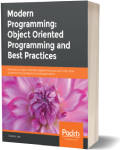Modern Programming: Object-Oriented Programming and Best Practices
Programming
Book Details
Book Title
Modern programming: object oriented programming and best practices: deconstruct object-oriented programming and use it with other programming paradigms to build applications
Author
Lee, Graham
Publisher
Packt Publishing
Publication Date
2019
ISBN
9781838986186
Number of Pages
172
Language
English
Format
File Size
1.54MB
Subject
Object-oriented programming languages
Table of Contents
- Preface
- Part One – OOP The Easy Way
- Chapter 1
- Antithesis
- Telling an Object What to Do
- Designing an Object
- Drawing an Object
- Opposing Functional Programming
- Capturing Elements of Reusable Design
- Finding a Method to Run
- Building Objects
- Conclusion to Part One
- Chapter 2
- Thesis
- Objects Are Independent Programs
- The Open-Closed Nature of Independent Objects
- The Design of Independent Objects
- Constructing Independent Objects
- Working with Independent Objects
- Conclusion to Part Two
- Chapter 3
- Synthesis
- Objects Are Independent Programs
- Objects Can Be Written, Inspected, And Changed in Context
- Put That All Together
- Conclusion to Part Three
- Part Two – APPropriate Behavior
- Chapter 4
- Tools That Support Software Development
- Introduction
- Version Control/Source Code Management
- Continuous Integration and Deployment
- Build Management
- Bug and work tracking
- Integrated Development Environment
- Static Analysis
- Code Generation
- Chapter 5
- Coding Practices
- Introduction
- Test-Driven Development
- Domain-Driven Design
- Behavior-Driven Development
- xDD
- Design by Contract
- Development by Specification
- Pair programming
- Code Reviews
- Programming Paradigms And Their Applicability
- Chapter 6
- Testing
- Introduction
- A Philosophy of Testing
- Black and White Boxes
- Test Case Design
- Automate All The Things
- Getting Someone Else In
- Other Benefits Of Testing
- Chapter 7
- Architecture
- Introduction
- Non-Functional Requirements Are Essential
- Defer When Appropriate; Commit When Necessary
- Justify Your Decisions
- When to Fix and When to Replace
- Know When to Nitpick, And When to Leave It
- Support, Don't Control
- Chapter 8
- Documentation
- Introduction
- Documentation Is More Useful Than You Might Think
- The Up-To-Dateness Problem
- Automatically Generated Documentation
- Analysis Paralysis
- How to Document
- Summary
- Chapter 9
- Requirements Engineering
- Study People
- You Shouldn't Necessarily Build What The Client Asks For
- Avoid Asking What You Want To Hear
- Understand The Problem Domain
- Uncover Tacit Requirements
- You Shouldn't Build What Your Client Wants
- Human Factors In Software Systems
- Prioritizing Requirements
- Is It Really "Engineering"?
- Chapter 10
- Learning
- Introduction
- Do as Much as You Can
- Don't Stick to Your Own Discipline
- Put it into Practice
- Collaborate and Share what you Learn
- Opportunities to Learn
- Rediscovering Lost Knowledge
- The Teaching Of Software Creation
- Reflective Learning
- Chapter 11
- Critical Analysis
- Introduction
- Criticism Is Often Uncritical
- How to Form an Argument?
- Forms Of Fallacy
- Further Reading on Arguments
- Debates and Programmers
- Software as Essays
- Chapter 12
- Business
- Introduction
- Evaluate Risks Dispassionately
- Find Out What You Need to Know, And How You Can Know It
- What You Discover May Not Be to Your Liking
- How to Interview A Programmer?
- Be Transparent and Honest with Your Business Partners
- Choose Appropriate Technology
- Manipulation and Inspiration
- You Don't Need to Be A Founder to Be A Programmer
- Chapter 13
- Teamwork
- Introduction
- Focus versus Interruption
- Working Environment
- Prioritizing Work
- Tell Experts What Needs to Be Done
- Working with Junior Programmers
- Working with Managers
- Patterns of Software Project Management
- Negotiation
- Empathy
- Shared Language and Shiny Buzzwords
- Chapter 14
- Ethics
- Introduction
- Examples of Ethical Codes
- Application of The Ethical Code
- Ethical Ambiguities
- Respecting Privacy
- Epilogue
- Chapter 15
- Philosophy
- Introduction
- Software as A Pursuit
- An Economic Philosophy of Software
- A Management Philosophy of Software
- A Social Philosophy of Software
- A Pedagogic Philosophy of Software
- What Does It Mean to Be "Good" At Making Software?
- Conclusion
